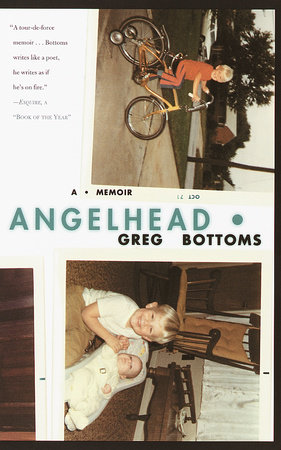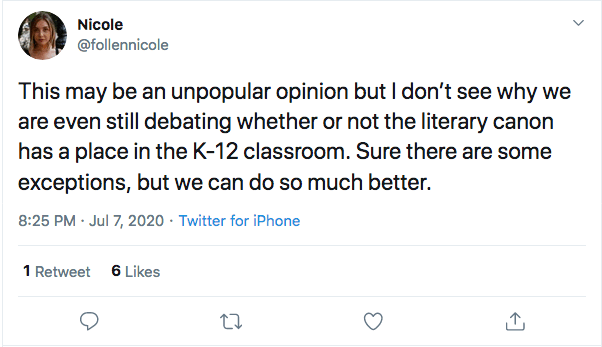 This past July, I spoke with my former student Nicole Follenius. Nicole was an English major at Stony Brook, and since earning her Master of Arts in Teaching at Stony Brook in 2016, she has been teaching at the Academy for Conservation and the Environment, a small public high school in Canarsie, Brooklyn. I’ve been following Nicole’s career admiringly on Twitter (@follennicole), and I contacted her for an interview as part of my book research. I’m working on a book about the experiences of generations of teachers and students with the high school canon – books such as The Great Gatsby and To Kill a Mockingbird – and Nicole caught my attention by tweeting about the subject:
This past July, I spoke with my former student Nicole Follenius. Nicole was an English major at Stony Brook, and since earning her Master of Arts in Teaching at Stony Brook in 2016, she has been teaching at the Academy for Conservation and the Environment, a small public high school in Canarsie, Brooklyn. I’ve been following Nicole’s career admiringly on Twitter (@follennicole), and I contacted her for an interview as part of my book research. I’m working on a book about the experiences of generations of teachers and students with the high school canon – books such as The Great Gatsby and To Kill a Mockingbird – and Nicole caught my attention by tweeting about the subject:
Nicole and I talked about the canon – about which we’re on the same page, so to speak – and much more. I’m filing much of the interview transcript in my research notes, but I’ve excerpted below parts of our conversation that I think will be especially interesting members of the English department community: especially Nicole’s journey from reluctant reader to ELA teacher. In reading it, I hope you’ll share in the pride felt by Nicole’s former teachers, some of whom are named below.
High School English – Now and Then
AN: Could you describe your students?
NF: Most of the students are from a Caribbean background – a lot of my students are Jamaican and Haitian. I have a lot of English language learners. A lot of them come either speaking Haitian Creole, French, Arabic…. Many of them, if they’re not first generation immigrants, are definitely second generation immigrants and most of them have been in the public school system their whole life. They go on to college – a lot of them go to CUNY colleges. We have pretty good scores in English…. you know, they take the Regents and they do well.
AN: Please talk to me about your own experience with high school English at Forest Hills High. Did you grow up in Forest Hills?
NF: I grew up in Middle Village which is close by. I actually went to high school for two years in a Catholic high school, and then I transferred to Forest Hills High School. So I went to Archbishop Molloy High School for two years in Queens. And then, I went to Forest Hills. But my experience was pretty much the same. I knew I liked writing, and I was good at it, but I definitely didn’t think I liked reading. I didn’t read the books that we were supposed to read. Really. Like, you know, maybe I read a little bit of it, and I Googled Spark Notes, you know, I looked at Spark Notes for the rest, but I didn’t really feel very engaged or connected to the material. In fact, my senior year, I almost didn’t graduate on time because I was failing English – because I just refused. I just couldn’t. We were reading, like, The Odyssey and The Iliad, and I just wanted nothing to do with it. So I didn’t have a great time in high school English.
AN: So tell me, how did your unhappy experience with reading in high school inform your own teaching?
NF: Well, I definitely think about the enjoyability factor. I know everything is not gonna be perfect. If it’s enjoyable for some, it’s not always gonna be enjoyable for others. But I definitely don’t select texts that I wouldn’t want to read. And that’s now: I always kind of imagine that high-school-me would have wanted to read these texts even less. Also, even if I have read the texts already, I read them again. Just so I could experience it again and kind of contextualize it, because things are obviously always changing. So something I taught four years ago might read differently now, so I just try to think about that. And it’s really just text selection. And also, I’m not gonna pretend that they’re gonna enjoy all of it, and I’m not mad at them if they don’t. And in fact, I feel like that kind of leads to a more critical conversation because we can talk about it–like–you know the feeling–well, I don’t know why the author did that or whatever. And you can kind of get to a more critical conversation in that way.
How (not to) read as an English Major
AN: But so how did it turn around? What made you an English major?

Cover of Angelhead by Greg Bottoms
NF: Well, I got through high school and I didn’t like English, but to be fair I didn’t really like any of the other subjects either. So I didn’t feel super strongly about not liking English. And then I went to Borough of Manhattan Community College – that’s where I started – And I remember I was in another English class, not reading, but they were talking about a book. And it sounded really interesting. And so I was like, actually, this sounds like a book I want to read. So I bought the book and it was too late to read it for the class, but I ended up just reading it anyway.
AN: Do you remember what book it was?
NF: Angelhead by Greg Bottoms. I still have it – because I read it a bunch of times after. It’s a semi autobiographical about a man whose brother growing up was a paranoid schizophrenic. And it kind of just goes through like, trying to grow up and understand, like who his brother was and how to deal with it. It was a lot of tragedy that the family kind of went through. I don’t know what it is. It just sounded way more exciting and, like they talked about, I remember, the character was listening to Radiohead. And I was like, I know Radiohead, this is something that is for me, you know? So I read it, and then I realized that I didn’t hate reading – I just hated reading certain books. Like, books I didn’t care about basically. And so then I kind of took, not a rebellious stance, but like, I’m going to be an English major, but I’m only going to read the books that I want to read. And I’m going to still be successful. And if it’s a book I don’t want to read, I’m not going to read it.
Well, there’s another book, and it’s called How to Talk About Books You Haven’t Read and—

Cover of How to Talk About Books You Haven’t Read by Pierre Batard
AN: I have a copy of that, but I haven’t read it! [Laughing.] My brother-in-law gave me a copy.
NF: [Laughing] I didn’t fully read it, but I read most of it, until the very end. But it talks about different ways of reading and different ways of not reading. And so, like, obviously, to get through life as an English major, I had to read, but I just kind of found the way that works for me. So maybe I’ll read the most important part. Or maybe I’ll, you know, skim. And I got very good at doing things like skimming and, you know, kind of getting through books that I didn’t really want to get through. I turned out I do like reading – I’m going to make it work for me. And that’s kind of what I did.
AN: I’m kind of cringing because, like, well, first you took “Native American Texts and Contexts” [EGL 379] with me. I think, if I remember, right? And then you took my survey of American literature [EGL 217]. And the reading is so terrible in that class.
NF: It was terrible [Laughing]. It was terrible. But you know I did read in your class…In your class I read Frederick Douglass for the first time. I always pretended to read it before that. And now I actually teach that book. So…I did read…some of the texts you assigned.
AN: Yeah, well, you might remember, I don’t do false advertising. I’m very open about how you know unaesthetic and un-entertaining a lot of the reading is for that class. And I try to encourage the students to do the kind of selective, active reading that you’re talking about because if you just plow through it, it’s really a miserable and unproductive experience. Right?
NF: I remember that about you, that you would be kind of honest and open about the fact that it wasn’t enjoyable necessarily to read them, that there was– another purpose to reading it. And that’s also something I do in my teaching. Like sometimes, we can’t always read fun texts. We just can’t. But I’m not gonna pretend like they’re fun. And so, if we can have a more honest experience with it, I feel like it’s easier together for everybody.
AN: That’s really helpful. I think that a lot of students don’t realize that, you know, it’s actually sometimes not even possible to read everything, and they get overwhelmed. I mean, I’m talking about college students. So it’s kind of a relief to realize that you can’t, that if you try to read every word that’s assigned to you, you’re just going to get swamped.
NF: But I think there’s a fear also. I’ve had teachers that I felt–like–they expected me to read every word. And so if I have a question or I want to talk about something, I feel like I wouldn’t be able to. I would be afraid that I would slip up. You know? I don’t know every detail. So, I guess I can’t go in and talk to them and ask for help because then I might come up with something and I might get caught. But if there’s a more open – look, we’re all in this together, it’s a little boring, it’s okay if you don’t know every word, it’s just more productive I think.
AN: But on the flip side there’s those students, and again, I am talking about college students — who you know they haven’t done the reading and they’re trying to sort of game the system by asking some sort of question or even commenting on a book that they haven’t read and getting that participation out of the way. That’s also super annoying.
NF: Yeah, I can understand that for sure.
Shout-Outs
AN: Any shout-outs to any of your community college teachers? Because it sounds like that’s kind of where you started to develop a different feeling about literary studies?
NF: Professor [Bil] Wright. I feel like he kinda knew that I wasn’t reading the books. I got better at it as it went along – like, half reading. But he kind of suggested that I didn’t have to read it word for word to still do a solid analysis of it. And so I kind of felt like he was more open to, I guess, the different ways that people interact with text.
AN: So how about people in our Teacher Ed program?
NF: Professor [Ken] Lindblom and Professor [Patricia] Dunn. They definitely influence a lot of what I do. People talk about first year teachers, how it’s, like you’re gonna be miserable and up until twelve o’clock planning and crying on your break. And I didn’t do any of that. I had a few moments, obviously – it wasn’t all perfect – but I definitely was prepared. Every administrator that has come into my room has been like, “Where did you go to school? Like, where did you learn how to plan like this?” Stony Brook is the best–in terms of planning. I didn’t have trouble planning when I walked in, like from the beginning I never had a problem with it. And I definitely attribute that to the Teacher Ed program at Stony Brook.
AN: So, besides Native American Texts and Contexts and American Literature I…. tell me about one of your favorite classes at Stony Brook.
NF: Science fiction with Professor [Bente] Videbaek. She’s like a permanent fixture in my head when I think of Stony Brook. I took so many classes with her. She teaches all these different classes.
AN: She’s a great teacher.
NF: I felt like it’s a unique department in that it’s such an intellectual community. Whether it’s the grad students or even the English majors…I feel like it’s such a welcoming community of people who want to talk about ideas and literature. And I feel like that’s something I really miss because, you know, I left Stony Brook thinking that every department of teachers would be similar: you know, [composed of] open, critical thinkers. And that’s not the case out in the trenches with teaching. And so, that’s something that I kind of definitely miss. I don’t think that happens everywhere.


Interesting!
Friday Night Funkin is not what you think when looking at the first images of the poster. It’s literally the funniest witty music I’ve ever played.
And the surprise is that it also has a storyline, not flying in and entering like other music games. No matter what the next steps are, in the beginning, I gave it an A+ because of the difference.
The story of the game is divided into several weeks, representing the encounters and challenges of the godfather for you. Each week there will be 3 different difficulty levels. The harder it is, the faster your rhythmic coordination as well as your speed of grasping the notes should be.
Thanks for the info
I really like reading books, but I don’t like writing tedious reports. No matter how exemplary a student you are, at some point your motivation reaches a low point. Especially when it comes to writing a hard dissertation, bestcustomessay.org is the service that will always come to your rescue. Even if you don’t want to completely trust such work to strangers, you can safely participate in the creation process. You will definitely be satisfied with the result